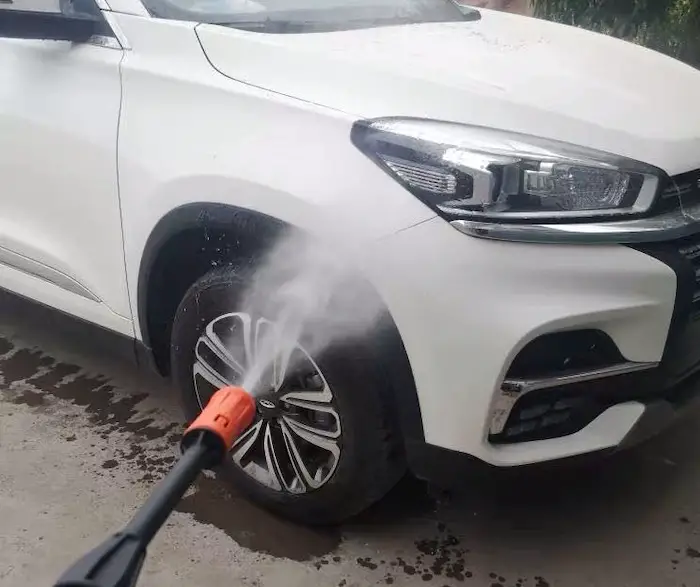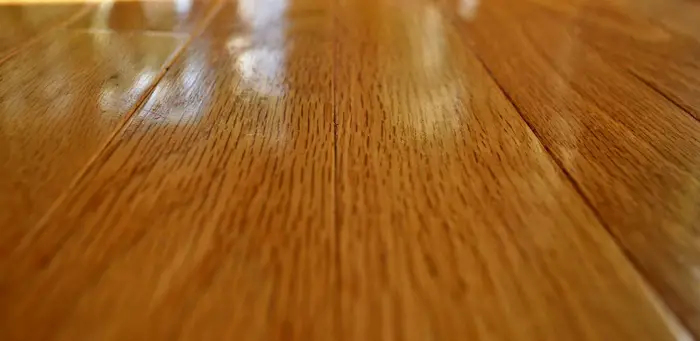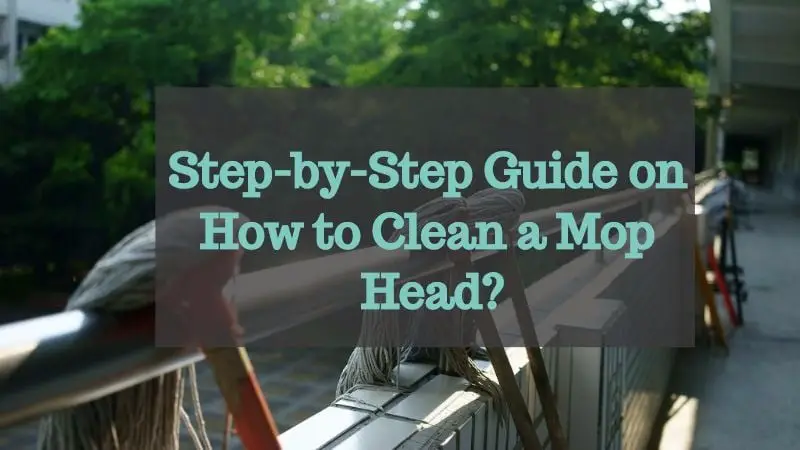Pressure washers are extremely powerful and specialized cleaning appliances that do at a great job at cleaning greasy, stained, and dirty surfaces. When high-pressure water is blasted on outdoor areas like walkways, patio, backyard, or fences, it makes cleaning more effective but water alone is not enough and you need a suitable detergent.
Can you use dish soap in a pressure washer? The answer is both ‘No’ and ‘Yes’. Dish soap is not specially formulated to work in a pressure washer, so it may not be able to cut through the most stubborn stains. While you may use it by properly diluting with water, dish soap will not be as effective as a soap or detergent that is specifically formulated for a pressure washer.
We know it appears pretty convenient to have what we have in the kitchen, and why not – after all dish wash detergent does a good job at cleaning almost everything. They are also safe, non-toxic, and biodegradable. Unfortunately, there are some downsides to using dish soap in your pressure washer, so let’s check them out.
Reasons To Not Use Dish Soap In A Pressure Washer
- When compared to special soaps and detergents, it does not clean effectively.
- It tends to make the surface too sudsy and soapy (if not diluted properly)
- Using dish soap may not be really cost-effective compared to other cleaners
- Post cleaning, it may leave a thin white film or residue on the surface
- It is not the best options for cleaning your vehicles
If the soap consistency is too thick, it can bunch up together to form a ball or gum that may clog the machine. This may often become too hard to remove, damaging the tubing and other parts of the pressure washer.
Soap that is weak and thin in consistency is not capable of doing anything. As the pressure washer gushes or propels water at an extremely high speed, this might cause the hand soap or even dish soap to get disintegrated in the process. This renders the soap useless for the cleaning job.
Likewise, too thick or dense soap may result in the opposite effect. Instead of getting dispersed too fast, a thick soap results in a soapy mess. It might reduce the speed and also impact the pressure of the machine, making it too slow to be useful.
What Do The Manufacturers Say
By using dish soap in a pressure washer, you not only risk potential clogging, but also stand the risk of avoiding the warranty. Our team has reviewed the user manuals of some of the best pressure washers in the market and here’s what the manufacturers say:
Simpson MS60773
The user manual clearly advises customers to avoid using anything other than soaps or chemicals that are specially designed to be used in the pressure washer.
Westinghouse WPX3200
In the user manual, it is clearly mentioned that the customers must only use the pressure washer safe soap specially formulated for these appliances.
Briggs & Stratton 020654
According to the user manual, the customers must only use the recommended and pressure washer safe soap.
Karcher G2900X
The user manual states that special Karcher detergent delivers the best results. They strictly warn against the use of non-recommended detergents as this might damage the device.
A-ipower APW3200
In the user manual, the manufacturer clearly advises using only detergent made for pressure washers and warns against using other soaps.
Craftsman CMXGWAS020734
The engine maker Briggs & Stratton states that although they do not recommend any specific soap to use for CMXGWAS020734, only pressure safe soap should be applied for cleaning.
Wen PW2800
As per the company, only the detergent specially formulated to be used with pressure washers must be used in this appliance.
Correct Way Of Using Dish Soap
If you still need to use dish soap for any reason (whether you prefer it or have run out of detergent), we suggest that you follow the right way of doing it. Here are some of steps you must follow:
- Always use a dish detergent that comes with a degreasing agent. For example, the very popular Dawn Dish Detergent.
- Mix 1/3 cup of dish detergent in a gallon of water to make sure the solution does not get too soapy or sudsy.
- Let the soap mix in the water completely and become a dilute solution to ensure that it does not damage the pump.
- Next, spray the solution on the area that you wish to clean and let it sit on for a while. Don’t let the liquid dry and rinse well.
- Make sure you rinse with a lot of water to completely get rid of any residue so that there is no soapy film on the surface.
- If you are concerned about your pressure washer getting damaged, you may choose to create a soapy solution in a separate bucket and apply it with a sprayer or brush.
Making Your Own DIY Pressure Washer Detergent
Some people are ardent DIYers and they prefer preparing their homemade solutions that any specialized products available in the market. So, if you are one of them then here’s a quick recipe to help you create your own effective pressure washer detergent right at home.
- Take a 5-gallon bucket and add one gallon of water to it. You can get one of these buckets from any hardware store or buy it online.
- Now add half a cup of washing soda and half a cup of borax to the water. Mix the solution thoroughly until both the powders are well merged into water. Make sure there are no chunks or else this may clog up the pressure washer.
- Now, mix one tbsp of liquid dish soap solution and stir properly to ensure a homogenous mix. Use a branded product like the Dawn dish soap.
- Now, add this soapy solution to your pressure washer and switch on the appliance. Start cleaning as usual with your homemade solution.
Pressure Washer Detergent And Soaps That Are Safe To Use
When speaking about safe detergents, we often talk about Dawn as one of the safest to use with pressure washers. This is a recommended brand for anyone who wants to start with cleaning the exterior areas of their homes.
It can’t be denied that Dawn has dishwashing properties, hence the Dawn dish soaps are extremely popular. However, when we break down the components and take a closer look, here are a few ingredients you must look for when choosing a good pressure washer detergent.
Surfactants
Chemical surfactants are undoubtedly one of the most primary ingredients that do the job of extracting oil and stubborn stains out of surfaces. In a normal situation, oil and water do not attract, but when a surfactant is used, it becomes easier for the soapy water to remove grease.
Sodium Lauryl Sulfate
This is a supporting ingredient that further intensifies the effect of surfactants. The power of surfactants helps in dislodging the grease, while the sodium lauryl sulfate does the job of dissolving oily surfaces.
Buffers
The buffers used in pressure washer detergents are chemicals such as potassium carbonate. The biggest advantage of buffers is that they ensure that the compound is not too alkaline or acidic. In any extreme, you stand the risk of damaging your pressure washer.
Best Cleaners to Use in a Pressure Washer
While dish soap and many other DIY cleaners made at home might help you clean surfaces well. However, we still suggest you to use a specialized cleaner for the routine jobs around the house to work efficiently and keep your appliance safe at the same time. Here are some reasons why you must rely on specially formulated cleaners:
The best quality cleaner is guaranteed to not choke up the workings of a pressure washer. They are capable of handling most of the cleaning jobs around the house efficiently.
Specialized pressure water cleaners are not as expensive as you think. The dish soap may cost you less but you will need only half the amount when using the special cleaner, plus you get the best results every time.
When you are cleaning a newly painted patio or your car, you will not want to risk working with a dish soap that may leave residue behind. It may even cause build-ups and damage your paint.
So, now that you know how important it is to use a specialized cleaner with your pressure washer, we have listed down a few recommended products for different situations.
For Automobiles

Many people do not prefer using a pressure washer to clean their car as it can be damaging for the automobile paint. However, there are some pressure washer models that allow users to reduce intensity, thus making it easier to clean. We recommend you to use Karcher Car Wash & Wax Soap for a perfect punch.
For Concrete Surfaces

If you are working on concrete, we suggest using the DIY cleaning recipe that we have shared earlier to save money. In case, you wish to get something more professional, we suggest that you use the Briggs & Stratton 6826 Multi-Purpose Cleaner and Concentrate on Pressure Washers. This versatile cleaner can restore your siding, patio and also remove mold stains.
For Fences and Decks

When cleaning your fence or deck, you must be careful about the type of method and cleaner used. As wood has a porous nature, using the wrong product may result in cracks. We suggest that you always use a good quality all-purpose cleaner such as the Briggs & Stratton 6827 Wood Surface Cleaner Concentrate for Pressure Washers.
Related Questions
Is dawn dish soap safe for pressure washing
Yes, dawn liquid soap introduced in 1973 is a good quality dishwashing detergent that can be safely sued with a pressure washer when a specialized cleaner is not available. This effective soapy solution is capable of blasting away greases, dirt, and stubborn stains from any surface.
What type of cleaner to use in the pressure washer
The type of soap or detergent to use in your pressure washer will highly depend on a few things such as the type of surface, the delivery system, the setting, and the type of soap or detergent. For example, when you need to remove mold and mildew on the sidings, you will need a detergent.
Can I use bleach in the pressure washer
No, we do not recommend using bleach in your pressure washer. If you must use it to get rid of mold discoloration, spray directly using a spray bottle, and use eye protection and gloves to avoid getting into your eyes or skin.
Can I use my laundry detergent
We advise that you do not because the laundry detergents are created for a different purpose. If at all you must, add it to a bucket of hot water and then use the solution.
See Also:
Can I Use Dishwasher Detergent To Hand Wash Dishes
Can I Use Dish Soap To Clean Oven?


